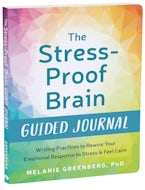By Melanie Greenberg, PhD, author of The Stress-Proof Brain Guided Journal
Much of the human brain’s physiological response to stress was laid down through thousands of years of evolution. A programmed stress response helped our ancestors take fast action to keep from being eaten by lions or failing to compete for food. In that sense, it was certainly a good thing!
Unfortunately, the same programmed response isn’t too good at helping us deal with modern-day stressors. These situations don’t generally call for physical action. They require understanding people’s intentions; dealing with failure, loss, or uncertainty; solving logistical problems; or sustaining mental effort. And they require us to process lots of information in a short time, juggle competing priorities, and deal with a rapidly changing world.
If you’re feeling stressed, it may be because your brain is oversensitive to danger. There are a few parts of your brain that shape your emotional and behavioral response to a stressful situation:
• Amygdala: Your brain’s alarm center. It senses threats and other emotionally significant information and initiates the stress response.
• Hypothalamus: Your brain’s operations manager. It coordinates the release of stress hormones to ready your body for fighting or fleeing.
• Hippocampus: Your brain’s biographer. It stores and retrieves conscious memories about the current situation as well as previous stressors you’ve experienced, how you responded, and resulting outcomes. This allows you to learn from past experience and anticipate what’s likely to happen.
• Prefrontal cortex: Your brain’s CEO. It puts together information from your amygdala and hippocampus to create a planned, motivated response to stress. It communicates back and forth with the amygdala to modify your response as the stressor unfolds.
When your amygdala first notices a stressor, it signals your hypothalamus to initiate a lightning-fast chemical response, releasing the hormones adrenaline and norepinephrine into your bloodstream to ready your body to fight or flee. In these moments, you may notice your heart rate speeding up, your breathing getting quicker, increased alertness, and a general boost of energy.
This is an automatic process that is hard to grab control of, but control is possible. And recognizing it is the first step.
Melanie Greenberg, PhD, is a practicing clinical psychologist, author, speaker, and coach; an expert on managing stress, health, and relationships using proven techniques from neuroscience, mindfulness, and cognitive behavioral therapy (CBT); and author of The Stress-Proof Brain.



 Part 2: What to Do When a Client Is Participating in Self-Judgment?
Part 2: What to Do When a Client Is Participating in Self-Judgment?